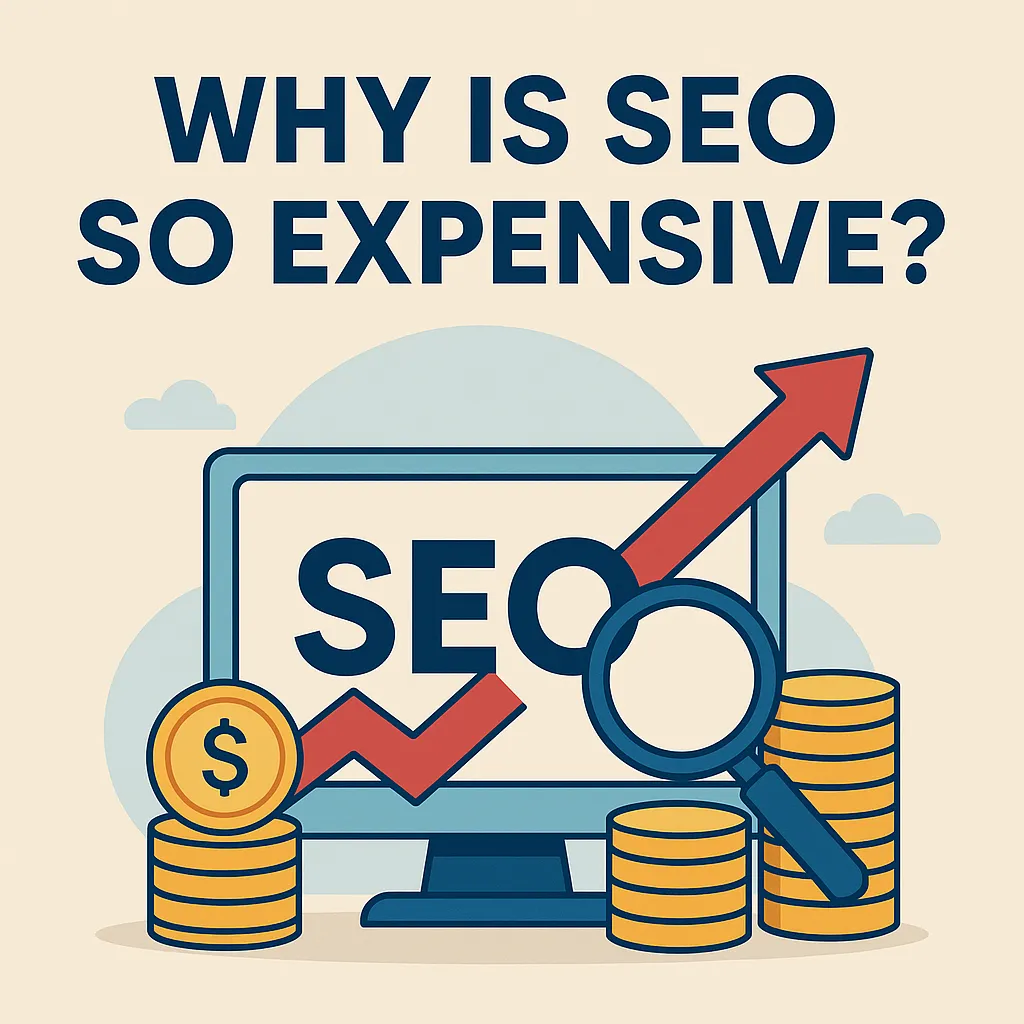
Why Is SEO So Expensive? (2025 SEO Pricing Guide)
If you’ve ever researched SEO or requested a quote, you’ve probably wondered, “Why is SEO so expensive?” It’s a question nearly every business owner asks at some point, and it’s a fair one. After all, SEO isn’t something you can see working the same way you can see ads running or mailers being sent. That makes the cost feel harder to justify at first glance.
The truth is, SEO isn’t just a service. It’s a system. Unlike a one-time task, it’s a layered process that combines technical expertise, content creation, link building, and continuous optimization. Think of it as building and maintaining digital infrastructure that helps your business get found 24/7.
By the end of this article, you’ll understand exactly why SEO costs what it does. We’ll break down what you’re actually paying for, which parts are worth the investment, and how to avoid overpaying for work that doesn’t move the needle.
The Real Reason SEO Seems Expensive
SEO feels expensive because it’s not a single service. It’s an ecosystem of work that has to come together. When you hire an SEO provider, you’re paying for technical SEO, content creation, link building, conversion rate optimization, analytics tracking, and strategy, all working in harmony. Each part takes skill, precision, and continuous attention.
There’s no magic switch that pushes your site to the top of Google. Every element of SEO, from writing optimized content to earning backlinks, takes time, expertise, and steady effort. The search landscape keeps changing, and Google’s algorithms become more advanced each year. Staying competitive means constant work and adjustment.
In short, SEO is resource-intensive. But when done right, it builds lasting digital equity that keeps paying you back.
For more on this, check out "How Much Does SEO Cost in 2025?"
What Drives SEO Costs? A Breakdown
1. Expertise (And Why It’s Worth It)
Real SEO requires more than checking boxes or following templates. It demands strategy, technical skill, and a deep understanding of how search engines work. When you pay for SEO, you’re paying for senior strategists, technical specialists, and content experts who can actually improve rankings and deliver results.
2. Time and Labor
SEO is labor-intensive. Good content takes hours of research, writing, and optimization. Link building means prospecting, outreach, negotiating placements, and monitoring links. Technical SEO work requires careful review and precise adjustments to keep your site healthy and competitive.
3. Tools, Tech, and Data
Good agencies invest in the right tools: Ahrefs, SEMrush, Ubersuggest, BrightLocal, and more. These tools provide the data needed to find opportunities, spot problems, and track progress. They aren’t cheap, but a quality provider absorbs that cost so you don’t have to.
4. Ongoing Nature of SEO
SEO isn’t something you do once. Search algorithms change. Competitors improve. New keywords and search behaviors emerge. What worked six months ago might not be enough today. That’s why SEO is ongoing infrastructure, not a one-time project.
Hidden Costs of “Cheap” SEO (And How They Cost You More)
Cheap SEO might look like a good deal at first, but the hidden costs can be massive. One common issue is spammy backlinks. Low-cost providers often buy links in bulk from low-quality sites, which can lead to penalties that hurt your rankings and are hard to recover from.
Then there’s thin content. Cheap SEO packages often skip meaningful content creation, leaving you with pages that don’t rank, don’t convert, and don’t build authority. Cookie-cutter strategies waste time and money because they aren’t tailored to your business, market, or competitors.
Finally, cheap SEO often comes with vague or no reporting. Without clear, honest reports, you have no idea if your investment is working, and that leads to wasted budget and missed opportunities.
How to Know If an SEO Price Is Justified
1. Ask for Detailed Deliverables
When you’re evaluating the cost of SEO, check the deliverables. A legitimate provider should show you exactly what will be done each month. Are they creating content? Building links? Optimizing technical elements? The more specific they are, the more confidence you can have that your budget is well spent.
2. Ask for Reporting Transparency
Good SEO isn’t a black box. Your agency should provide clear, detailed reports that show what’s been done, how your site is performing, and where things are headed. Vague statements like “you’re getting more visibility” don’t cut it. You want measurable data: rankings, traffic, conversions, link placements, and more.
3. Ask Who Does the Work
Make sure you know who’s behind the work. Is your SEO handled by experienced strategists and specialists, or farmed out to the lowest bidder? The cost of SEO reflects the quality of the team, and that makes all the difference in your results.
When SEO Becomes a Bargain (Yes, Really)
What seems expensive at first often turns out to be a bargain when you look at the long-term return. The real cost isn’t what you pay for SEO. It’s what you lose by not showing up when customers are searching. Every lead, sale, or opportunity that goes to a competitor is revenue you could have had.
Unlike ads that stop the moment you stop paying, SEO builds digital assets that continue to work for you long after the initial investment. That’s why effective SEO, while it may seem costly upfront, delivers one of the highest returns on investment of any marketing channel.
Final Thoughts: Don’t Fear the Cost, Fear Wasted Budget
Expensive SEO isn’t the real problem. Ineffective SEO is. It’s easy to focus on the price tag, but what really drains a marketing budget is paying for work that doesn’t produce results. When SEO is done right, it becomes one of the best investments your business can make, paying for itself many times over in leads, sales, and long-term visibility.
The key is to invest in work that delivers real value. That means partnering with professionals who are transparent, accountable, and focused on outcomes, not just activity. Don’t fear the cost of SEO. Fear wasting money on efforts that won’t move the needle for your business.

